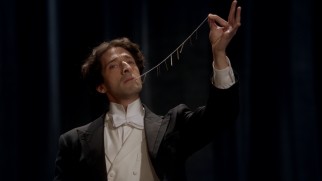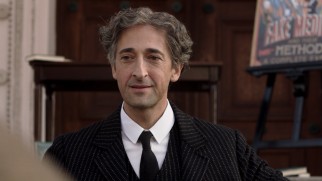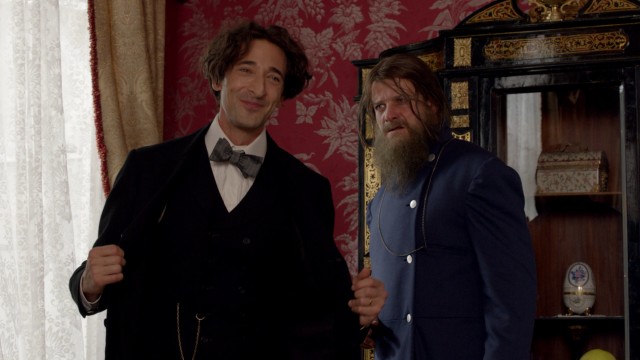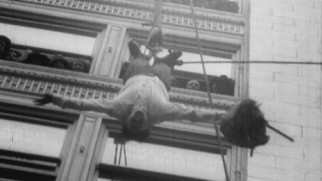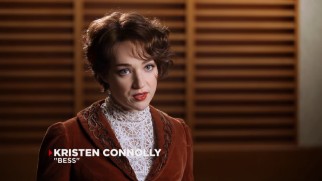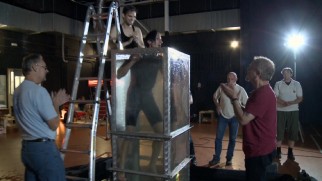Houdini: 2-Disc Extended Edition Blu-ray + Digital HD Review
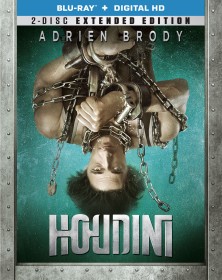 |
Houdini Miniseries & Blu-ray Disc Details Director: Uli Edel / Writers: Nicholas Meyer (teleplay); Bernard C. Meyer (book Houdini: A Mind in Chains: A Psychoanalytic Portrait) Cast: Adrien Brody (Harry Houdini), Kristen Connolly (Bess Houdini), Evan Jones (Jim Collins), Tim Pigott-Smith (William Melville), Tom Benedict-Knight (Dash Houdini), Shaun Williamson (Riley), Megan Dodds (Margery Crandon), David Calder (Sir Arthur Conan Doyle), Linda Marlowe (Lady Doyle), Madeleine Potter (Houdini's Mistress), Michael Terry (Sol), Stevan Rimkus (Maxwell), Anthony Cozens (Chauncey Kidd), Chrissie Cotterill, Eszter Σnodi (Cecilia Weiss), Louis Mertens (Erich Weiss), Connor Kelly (Young Dash Weiss), Jeremy Wheeler (Rabbi Weiss) Original Air Dates: September 1-2, 2014 / Running Time: 174 Minutes (extended), 151 Minutes (broadcast) / Rating: Not Rated (TV-14-VSL on air) 1.78:1 Widescreen / 5.1 DTS-HD Master Audio (English) Subtitles: English for Hearing Impaired, Spanish Not Closed Captioned; Extras Not Subtitled Blu-ray Release Date: October 7, 2014 / Suggested Retail Price: $29.99 Two single-sided, dual-layered discs (BD-50s) / Blue Eco-Friendly Keepcase in Embossed Cardboard Slipcover Also available on DVD ($26.98 SRP) and Amazon Instant Video |
Buy Houdini from Amazon.com: Blu-ray + Digital HD DVD + Digital Instant Video
Gandhi. Nixon. Lincoln. Certain biopics use nothing more than a last name for their title. You know exactly who they're talking about and no matter how informed or not you are about the subject, you're likely compelled to watch a movie so bold as to imply with its succinct surname title that it offers the definitive version of that person's life.
Houdini is a miniseries, not a movie, but the effect is the same. Early last month, History (nιe The History Channel) broadcast this two-part, 3½-hour miniseries on Labor Day and the following weeknight. We all know Harry Houdini's name. Still, who among us couldn't stand to learn a thing or two about the life Houdini opens with the following proclamation: "What you are about to see is FACT. (pause) It is also FICTION. (pause) We defy you to tell the difference..." That challenge is no tall order, but its very existence may disappoint viewers expecting to find something historically accurate on a channel called History. Entertainment, not authenticity, is clearly the top priority for this production, written by even-numbered Star Trek sequel scribe Nicholas Meyer from a 1976 book by Meyer's late father Bernard, a psychiatrist/psychoanalyst.
The miniseries begins none too promisingly with some corny voiceover narration which alludes to escapes and getting punched in the stomach, two things Houdini is best remembered for. The production leaps around chronologically, moving from Houdini's 1914 Mississippi River underwater unshackling after a St. Louis bridge plunge to an 1896 performance in Ohio, where inadvertently booked in a brothel, the young, green magician reluctantly performs and wins over the uninterested crowd by breaking free from a police officer's volunteered handcuffs.
We're told Houdini's greatest escape (groan) was from Appleton, Wisconsin, where he grew up as the son of Jewish Hungarian immigrants: a stubborn rabbi and a mother whom Harry (born Erich [sic] Weiss) adored. In Coney Island 1896, where he's performing an act with his brother Dash, Harry falls for Bess (Kristen Connolly), a vaudeville dancer whom he flirts with (using some basic tricks) during her show. His magical courting continues with an abrupt marriage proposal. She accepts and is disowned by her mother for marrying a Jew.
Houdini rises from common magician to escape artist and becomes very popular. He performs for the Kaiser (whom he wins over with a seemingly daring bullet catch) in a private German show and in Russia before Rasputin and Anastasia. In a bit of fancy Chuck Barris would appreciate, Houdini is secretly contacted by the government, who forge him an American birth certificate and ask him to engage in espionage for them shortly before the onset of World War I. Ludicrously, the illusionist is shown performing a heist in a high-ranking official's safe while a captive theater audience wonders if he'll truly be able to escape the out-of-sight safe onstage.
The second part finds Houdini struggling to maintain his following. Charlie Chaplin movies emerge as his competition and Houdini's love of his mother develops into something more like infatuation. When she dies (one of several metaphorical gut punches), he becomes determined to communicate with her on the other side. Instead, he finds so-called psychic mediums are nothing more than fakes, using their own tricks to dupe those mourning. Sir Arthur Conan Doyle is convinced that Houdini has spiritual gifts, but Conan Doyle's wife is simply another medium for Houdini to expose as a fraud, as he publishes his findings and offers a large cash reward to any psychic who can convince him of their legitimacy. This cause will literally be the death of the illusionist/debunker.
Shot in Budapest with a primarily local cast and crew, Houdini takes advantage of modern techniques. CGI brings us inside the gears of handcuffs and the protagonist's stomach muscles and organs after he endures fierce blows there. Such flourishes are meant to endear audiences who have taken to Guy Ritchie's Sherlock Holmes movies, but they feel out of place on a History biography. Digital video, modern editing, and electronic score do the miniseries no favors. The lattermost component is especially perplexing because composer John Debney is clearly capable of something more suitably whimsical, which he offers only occasionally here.
Striving for accessibility, Houdini spares Brody and company from doing any accents whatsoever or using the parlance of the time. Connolly is especially egregious at exuding a contemporary feel, sounding like a cast member of "The Real Housewives of the Edwardian Era." The CGI-heavy period production is ambitious but often hollow, as it prefers to conform to modern moviegoer tastes than to attempt something more befitting of the subject and remotely historically accurate. In spite of its easily fixed faults, Houdini still manages to entertain on the panache of its personality.
Lionsgate has treated Houdini to a 2-Disc Extended Edition on both DVD and Blu-ray. Each set lives up to that moniker with an elongated 174-minute cut of the miniseries on Disc 1 and the original 151-minute broadcast version on Disc 2. I watched the former and didn't notice any obvious superfluousness, so this may be less a home video marketing gimmick and more a product of History squeezing in too many commercials into their broadcasts (the second night only filling 90 minutes of air instead of two hours seems directly responsible for the deletions that have been restored). Still, credit Lionsgate for including both cuts where many studios might only offer the extended one. As long as they were being generous, they might have thought to give you the chance to watch the miniseries as a long movie with combined credits and no halfway recap (which the asymmetrical broadcast cut drops), but of course, chapter stops and fast forwarding make that fairly easy for you to achieve.
VIDEO and AUDIO
You expect a 2014 miniseries to look stellar on Blu-ray and for the most part, Houdini does. The 1.78:1 element remains clean, sharp, and well-defined throughout. Some stock footage shots stand out for the light grain they exhibit. Of course the numerous visual effects aren't as seamless as their big screen counterparts (at times, they're downright unsightly). Nonetheless, the picture pleases highly. So too does the 5.1 DTS-HD master audio soundtrack, which comes close to approximating the theatrical experience with its winning atmosphere and lively score. A tiny bit of non-English dialogue is translated by yellow burned-in subtitles, which are oddly arranged and with a conspicuous lack of punctuation.
BONUS FEATURES, MENUS, PACKAGING and DESIGN
Four short, promotional, interchangeable HD featurettes With a tiny bit of behind-the-scenes footage, comments from cast, crew and a biographer, and clips of the real man at work, "Houdini the Greatest" (3:56) celebrates the illusionist.
"The Great Escapes" (4:00) focuses on Houdini's various escape stunts, only some of which make it into the miniseries, his "viral" marketing, his death and legacy.
"The Real Houdini" (3:09) considers Houdini's personal life, with more remarks from actors and experts plus a lot of historical photos and film.
"Cheating Death" (3:34) shows Brody rehearsing the movie's stunts, Disc 2 opens with trailers for Draft Day, The World Wars, "Mad Men": Season 6, The Rover, and The Men Who Built America. The same things repeat from that disc's "Trailers" listing.
Each disc's menu levitates still photos in front of a slowly zoomed-out cover art on a stage while an excerpt of piano score plays. The Blu-rays kindly both support bookmarks and allow you to resume playback.
The two discs are packaged in an eco-friendly keepcase which is fitted with an insert supplying your Digital HD UltraViolet code and topped by an appropriately embossed foil-faced slipcover.
CLOSING THOUGHTS
In an effort to appeal to typical television viewers, History's Houdini comes across as phony and pandering. The miniseries' subject warrants interest and one does gather a better understanding of his life. But the fictionalizations, anachronisms, and aggressive contemporary style do cheapen the experience and diminish its value. While the production is still an easy watch and preferable to a lot of cable TV, this is not the definitive account of the man nor the must-see event implied.
Lionsgate's Blu-ray provides very good picture, great sound, and a light but okay handful of bonus shorts that could and should have been combined into one 15-minute featurette.
Buy Houdini from Amazon.com: Blu-ray + Digital HD / DVD + Digital / Instant Video |
Related Reviews:
DVDizzy.com | DVD and Blu-ray Reviews | New and Upcoming DVD & Blu-ray Schedule | Upcoming Cover Art | Search This Site
Adrien Brody: Third Person The Darjeeling Limited Midnight in Paris The Grand Budapest Hotel The Experiment The Village
Kristen Connolly: The Cabin in the Woods | Evan Jones: October Road: Season 1 Gangster Squad Mr. 3000 Glory Road
Written by Nicholas Meyer: Star Trek II: The Wrath of Khan & Star Trek IV: The Voyage Home The Seven-Per-Cent Solution
Magicians: Now You See Me The Prestige Oz the Great and Powerful New York Stories The Incredible Burt Wonderstone
Sherlock Holmes Winter's Tale The Murder of Mary Phagan Bonnie & Clyde (2013) Behind the Candelabra
New: Still Life: A Three Pines Mystery Millon Dollar Arm The Calling

